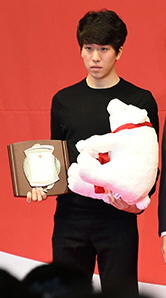Kim Ki-hoon is a retired short-track speed skater and the first gold medalist in the Winter Olympics for South Korea. Kim is a three-time Olympic Champion and 1992 Overall World Champion.

Choi is a Korean family surname. As of the South Korean census of 2015, there were around 2.3 million people by this name in South Korea or roughly 4.7% of the population. In English-speaking countries, it is most often anglicized as Choi, and sometimes also Chey, Choe or Chwe. Ethnic Koreans in the former USSR prefer the form Tsoi (Tsoy) especially as a transcription of the Cyrillic Цой.
Yoo or Yu, or sometimes Ryu or Ryoo, is the English transcription of several Korean surnames written as 유 or 류 in hangul. As of 2000, roughly a million people are surnamed Yoo in South Korea, making up approximately 2% of the population. Of those, the most common is Ryu, with more than six hundred thousand holders, whereas Yoo accounts for about one hundred thousand.
Baek, also often spelled Paek, Baik, Paik, or Back is a Korean family name. In the year 2000, there were 351,275 people with this surname in South Korea. The word means the color white.

Jung is a Latin alphabet rendition of the Korean family name "정", also often spelled Jeong, Chung, Joung or Jong. As of the South Korean census of 2015, there were 2,407,601 people by this name in South Korea or 4.84% of the population. The Korean family name "정" is mainly derived from three homophonous hanja. 鄭 (2,151,879), 丁 (243,803) and 程 (11,683). The rest of the homophonous hanjas include: 政 (139), 桯 (41), 定 (29), 正 (22) and 情 (5).
Seung-jae is a Korean masculine given name. Its meaning differs based on the hanja with which it is written. There are 15 hanja with the reading "seung" and 20 hanja with the reading "jae" on the South Korean government's official list of hanja which may be used in given names.

Lee Seung-hoon is a South Korean speed skater. He won a gold medal in the 10,000 metres, a silver medal in the 5000 meters at the 2010 Winter Olympics, becoming the first and only Asian man ever to achieve these feats, a gold medal in mass-start at the 2018 Winter Olympics, a gold medal in the mass start at the 2016 World Championships in Kolomna, and a bronze medal in mass-start at the 2022 Winter Olympics. He was a short track speed skater, winning the 2008 World Championship 3000 m super-final and three gold medals at the 2009 Winter Universiade. Lee converted to long track in September 2009, as he failed to earn his spot on the South Korea national short track team in the national trials.

South Korea participated in the 2011 Asian Winter Games held in Almaty and Astana, Kazakhstan, from 30 January to 6 February 2011.
Ji-hoon, also spelled Ji-hun, is a Korean masculine given name. The meaning differs based on the hanja used to write each syllable of the name. There are 46 hanja with the reading "ji" and 12 hanja with the reading "hun" on the South Korean government's official list of hanja which may be used in given names. Ji-hun has been a popular name for South Korean baby boys for several decades, coming in fourth place in 1970, first place in 1980, and first place again in 1990. In 2008 it was the second-most popular name for baby boys, with 2,158 given the name.
Seung-hoon, also spelled Seung-hun, is a Korean masculine given name. Its meaning differs based on the hanja with which it is written. There are 15 hanja with the reading "seung" and 12 hanja with the reading "hoon" on the South Korean government's official list of hanja which may be used in given names.
Min is an uncommon Korean family name.
Hoon, also spelled Hun, is a single-syllable masculine Korean given name, as well as a morpheme in many other Korean given names. The meaning differs based on the hanja with which the name is written.

Kim Cheol-min is a South Korean speed skater.

Joo Hyong-jun is a South Korean speed skater.
Seong-hui or Sung-hee, also spelled Song-hui in North Korea, is a Korean unisex given name. Its meaning differs based on the hanja used to write each syllable of the name. There are 27 hanja with the reading "sung" and 24 hanja with the reading "hee" on the South Korean government's official list of hanja which may be registered for use in given names.
Dong-hoon, also spelled Tong-hoon or Dong-hun, is a Korean masculine given name. Its meaning differs based on the hanja used to write each syllable of the name. There are 24 hanja with the reading "dong" and 12 hanja with the reading "hoon" on the South Korean government's official list of hanja which may be registered for use in given names.
Events from the year 1994 in South Korea.
Kim Tae-hoon may refer to:
Lee Sang-hun or Lee Sang-hoon (Korean: 이상훈) is a Korean name consisting of the family name Lee and the given name Sang-hun, and may also refer to:
This page is based on this
Wikipedia article Text is available under the
CC BY-SA 4.0 license; additional terms may apply.
Images, videos and audio are available under their respective licenses.




